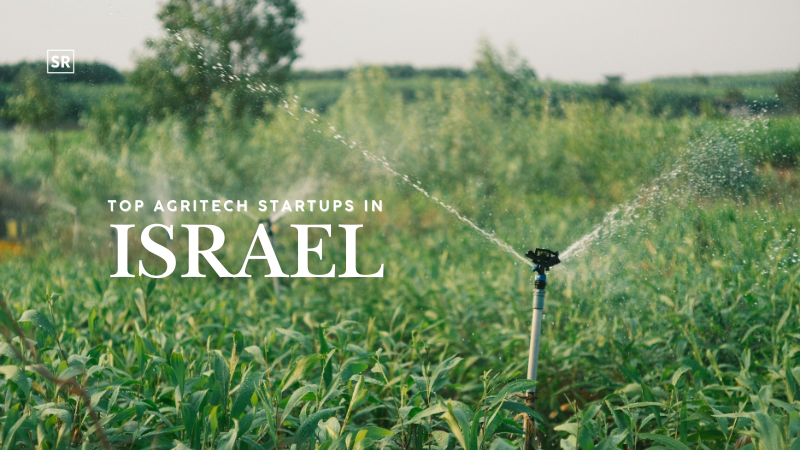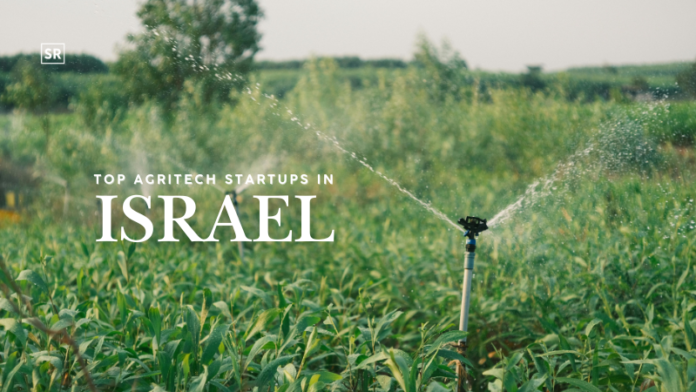
Israel’s agricultural sector is known for its innovative approach and intense focus on research and growth, particularly in precision farming and sustainable agriculture. Cultivation of oilseeds grains, and cereals significantly contributes to the economy with exports playing a vital role in international trade. The market is thriving thanks to a variety of crops, advanced irrigation systems, and a commitment to innovation and sustainability.
The agriculture market in Israel is projected to grow by USD 2.76 billion at a compound annual growth rate of 4.6% from 2023 to 2028. A significant trend in the growth of Israel’s agriculture market is the use of artificial intelligence and robotics. Over the past century, agriculture has evolved, and recent advancements in AI, machine learning, robotics, and the Internet of Things are enhancing modern farming practices. The latest innovations in farming include AI-based management platforms and autonomous drones for harvesting fruit.
Around 637 companies in the agriculture sector are supported by 51 innovation hubs. Despite facing difficulties in Q1 2024, investor interest remains strong, and companies are achieving significant milestones. Although total investments and average deal sizes have decreased, confidence in autonomous solutions and digital tools is growing. In Q1 2024, 37 investors participated in 19 investment rounds totaling $77 million in equity.
Here is a list of 10 Agritech Startups in Israel that are changing the landscape of Agriculture.
Table of Contents
CropX
Founded Year: 2013
Location: Tel Aviv, Israel
Stage: Series C
Funding: $51.4M
CropX is a user-friendly agronomic farm management system that utilizes AI and machine learning to connect farm data, real-time conditions, and agronomic knowledge. It offers guidance for successful and sustainable farming while consolidating all agronomic data in one place for easy tracking and sharing.
The company also provides wireless sensors for monitoring soil moisture. These sensors are put in irrigation fields to send live updates on soil moisture and temperature. Their website and app use this info to make irrigation maps and figure out water needs on their own.
SeeTree
Founded Year: 2017
Location: Herzliya, Israel
Stage: Series C
Funding: $65.2M
SeeTree digitises the monitoring of trees in orchards and forests through its “Intelligence Platform for Trees.” The platform offers machine learning solutions to analyse tree health, allowing users to identify weak trees, tree clusters and overall health of trees using AI, IoT multi-sensor data and drone imaging. It uses geospatial and object recognition algorithms to identify, measure, and organise data from orchard trees, which helps with precise decision-making. SeeTree has scanned over 500 million trees worldwide by collecting data from drones, aeroplanes and satellites, providing valuable insights to its customers. This platform gives detailed information that helps growers track their trees and enhance productivity.
The company serves clients in Brazil, California, Florida, Mexico, South Africa, and the APAC region. SeeTree’s mission is to help tree growers optimise their crops through a complete data-driven service that enhances operational efficiency and tree productivity over time.
Prospera
Founded Year: 2013
Location: Tel Aviv, Israel
Stage: Acquired
Funding: $26M
Prospera Technologies is a company that uses artificial intelligence and machine learning to develop solutions for monitoring crop health and managing irrigation. Its AI-based sensors and cameras track crops to identify issues and target treatments effectively. The technology helps growers decide when, where, and how much to irrigate based on weather, soil and crop data. Prospera provides easy-to-understand insights from the data it collects.
The company’s goal is to assist growers in making informed decisions to enhance food production and sustainability. Prospera also offers computer vision solutions that continuously monitor plant health development, and stress. Its technology captures visual and climate data from the field and delivers actionable insights through mobile or web platforms. Prospera supplies both hardware and software for its solutions and employs agronomists and agricultural experts to interpret the data. The company currently operates in the USA, Spain, and Mexico.
Netafim
Founded Year: 1965
Location: Tel Aviv, Israel
Stage: Acquired
Funding: $500M
Netafim manufactures components for drip irrigation and develops smart irrigation systems. It has also expanded into smart devices for monitoring and remotely controlling irrigation valves, as well as IoT-based digital platforms for crop management.
Netafim is part of Orbia, a company focused on advancing life worldwide. Orbia’s five business groups aim to improve access to health and wellness, reinvent cities and homes, ensure food and water security, connect communities to information, and promote a circular economy through materials and innovative solutions.
Farm Dog
Founded Year: 2015
Location: Tel Aviv, Israel
Stage: Acquired
Funding: $910K
Farm Dog offers a pest and disease management platform that helps growers optimise field treatments, increase yields and support environmental sustainability. Its solution ensures fields receive the right treatment at the right time and place using AI-enabled workflow software and analytics.
The Farm Dog app allows users to track pests, diseases, weeds and trap counts. It provides georeferencing and photographic records, logs field visits, sets reminders for special checkups and alerts farmers to revisit past hotspots and neglected areas. The app can also send reports directly from the field.
Phytech
Founded Year: 2010
Location: Ashkelon, Israel
Stage: Series C
Funding: $37.5M
Phytech helps growers improve farming production with an IoT platform that offers clear visibility into operations and AI-based agronomic recommendations that can be executed automatically. The company provides a decision support service aimed at increasing yields and optimising irrigation. This service uses innovative plant sensors to monitor growth in real-time and sends critical alerts to growers through web and mobile applications.
Phytech specialises in sensor-based technology for monitoring crops. Its system uses plant sensors to provide users with a constant stream of real-time data, which help them in tracking crop conditions and gain insights into plant health.
BEEWISE
Founded Year: 2018
Location: Nahariyya, Israel
Stage: Series C
Funding: $120M
Beewise uses AI and robotics to protect bees on a large scale, to help feed the world. Beewise’ solution to save bees, BeeHome, allows for remote inspection and treatment of bees in real time. This technology addresses challenges like extreme weather, pests, diseases, and the shortage of skilled beekeepers. By using AI and robotics for real-time treatments in the field, the BeeHome reduces annual colony losses to less than 10%, compared to nearly 50% with traditional wooden hives.
Beewise provides AI and SaaS-based solutions for autonomous beehive management. Its system includes features like solar power, climate control, humidity control, pest control, swarm prevention, automated harvesting and real-time alerts for problems. The company also offers rental services for its technology.
Afimilk
Founded Year: 1977
Location: Tiberias, Israel
Stage: Late Stage
Funding: $11.3M
Afimilk is a global leader in developing advanced systems for modern dairy farms and herd management. Afimilk was the first company to introduce an electronic milk metre and has continued to innovate in the field.
The company’s products include software, monitoring systems, sensors, and smartphone apps. Their flagship product, AfiFarm, collects and analyses data on each animal to provide real-time information to farmers. Afimilk’s solutions help improve the health and fertility of herds, enhance milk quality and boost productivity. They also assist farmers in making better decisions about animal purchases, preservation, and disease prediction.
Afimilk’s systems are used on thousands of farms in over 50 countries. The company offers a range of products to address various dairy farm operations, including management software that analyses data from on-field sensors, milking parlour automation systems and cow monitoring systems with neck collars for health tracking.
ViAqua
Founded Year: 2014
Location: Rehovot, Israel
Stage: Series A
Funding: $12.5M
ViAqua Therapeutics provides effective and affordable health management solutions for diseases in aquaculture. The company has received investments from various organisations, including The Trendlines Group, Nutreco, VisVires New Protein, S2G Ventures, Thai Union, and the Technion–Israel Institute of Technology, with support from the Israel Innovation Authority.
ViAqua develops RNAi drug delivery technology specifically for aquaculture. The company has created an orally administered treatment that prevents diseases from developing and stops viral outbreaks. Its platform uses a proprietary RNAi nanoparticle formulation delivered through feed or immersion, triggering a cell reaction to disable viral infections.
YieldX enhances Poultry Biosecurity
Founded Year: 2020
Location: Pardes Hanna-Karkur, Israel
Stage: Seed
Funding: $1.5M
YieldX provides biosecurity solutions for poultry farms using sensors, machine learning, and IoT technology. Their system continuously monitors farm environments without human intervention by leveraging vision, sound, and smell. One of their key products, RedMiteSense, is a smart sensor that uses AI for continuous monitoring and early detection of red mites in layer poultry farming.
Another product, BioCore, is positioned in fixed locations to monitor ambient conditions and live inventory movements. TrolleyMateTag is attached to egg or chick trolleys to track their movement. YieldX’s AI-based platform analyses data from these devices and alerts farm owners about potential threats. This early detection of disease outbreaks and pest infestations allows farmers to address issues proactively and maximize yields.
YieldX’s technology enables poultry businesses to predict outcomes and respond quickly to biological processes creating a competitive advantage in maintaining disease-free production. Their approach ensures the sustainable and optimal use of biological resources, benefiting both the environment and human well-being.
Conclusion
Israeli agritech companies are leaders in agricultural innovation. These startups are providing solutions that increase farm output and quality. Farmers can make informed decisions about crop health, irrigation, and pest control by using data-driven insights, which leads to better yields and resource efficiency.
These companies address food security challenges by boosting productivity and improving crop quality and soil health. They also develop technologies to help farmers adapt to the effects of climate change, such as drought and temperature fluctuations. Additionally, Israeli agritech startups are focusing on non-toxic weed control methods that protect human health and ecosystems. They are also working on technologies to improve natural pollination efficiency, including smart hives for monitoring and data collection. Overall, Israeli agritech plays a key role in shaping the future of global agriculture.
FAQs
Which country uses the most technology in agriculture?
Israel is a leader in agricultural technology and is known for innovations like drip irrigation and N-micro irrigation systems.
How many agritech startups are there in Israel?
Israel is home to 391 agritech startups, including companies like Crops, Citri, Farm Dog, and Prospera.
What are some of the Israeli technology in agriculture?
Israeli agricultural technology includes drip irrigation, precision farming, AI-powered smart sprinklers, autonomous machinery, soil sensors, cloud software for irrigation advice, and drones to help farmers monitor crops, all aimed at improving efficiency and reducing resource use.





